Inside Sumo's game jam
Let's wrestle.
It's Friday afternoon, in a small room that's part of Sumo Digital's vast Sheffield complex, and there's a towering stack of pizzas steadily growing shorter. In the kitchen, alongside a wall of metal shelves that's fully stocked with every single soft drink you could think of (in the interests of full disclosure, you should know I took a can of Lilt), there's a chilli jam contest being judged. I'm too late to sample the eventual winner, but the one I do try - made with coffee and sangria, no less - is like nothing I've ever tasted before. It almost makes me regret tucking into one too many slices of that pizza beforehand.
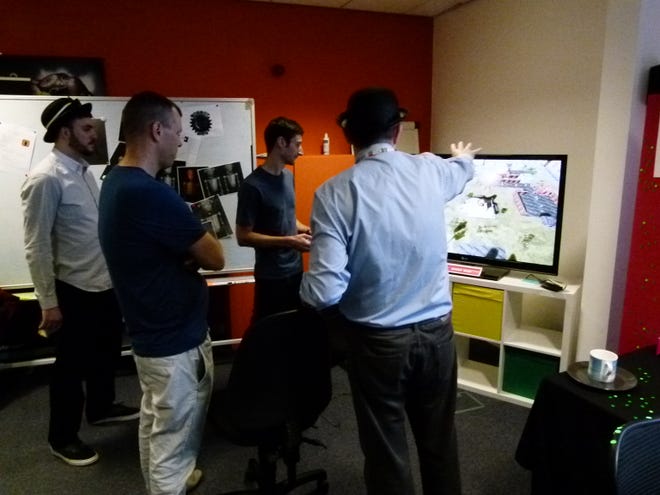
I'm not sure if every Friday's like this at Sumo Digital, but it all seems like a lot of fun. Tools have been momentarily downed and the company's internal game jam is in full swing, that room that's full of pizzas bustling with several small teams as they demo their work to their peers. There are two men in bowler hats, showing off a curious and imaginative spin on the tower defence genre. There's one game with staggering production values that's all the more staggering when you sit down to play it and realise it's controlled entirely by tracking your eyes. There's the one developer who's trekked up from Sumo Digital's Nottingham office to show his own project, a brilliant logic puzzle that's all about making your own game - and playing it is enough to convince you, as will an afternoon in this company, that making games might not be totally awful.
This is a brief pause in this most industrious of studios, situated somewhat fittingly opposite some of Sheffield's old steelworks. It's a different kind of craft being practised at Sumo Digital, but the productivity here is staggering; this is a studio that's worked in recent years on LittleBigPlanet, on Forza and on Hitman, and that's currently heads down on Dead Island 2 and Crackdown 3 (the delay to which happened after my visit - and I'm fairly sure taking an hour out for lunch to tuck into those pizzas had nothing to do with it). And that's just the games we know about.
This has been the way for the 14 years that Sumo Digital's been around, and ever since the studio first made its name with its Xbox port of OutRun 2. This is an outfit that's been, as I wrote earlier this year, the safest pair of hands in gaming, a developer that's brought a level of care and attention to an amazingly broad range of projects from Wii family games to Sega's Sonic & All-Stars Racing Transformed. In recent years, though, Sumo Digital's been undergoing something of a transformation of its own, with a management buyout from its former owners Foundation 9 setting the studio on a more independent path.
Snake Pass was the first fruit of that new independence, itself a product of Sumo Digital's first internal game jam - a tradition that it's now upholding regularly. "We'd talked about doing a game jam for a couple of years as something good to do for the studio's creativity," Paul Porter, Sumo Digital's COO, tells me. "But we wanted to make sure we had everything lined up perfectly." It took the arrival of video game luminary Ian Livingstone to the board to make it happen, however. "He came along and said 'just do it'! Don't worry about making it perfect, just try something and do it. Give people a day and let's see what they can do."
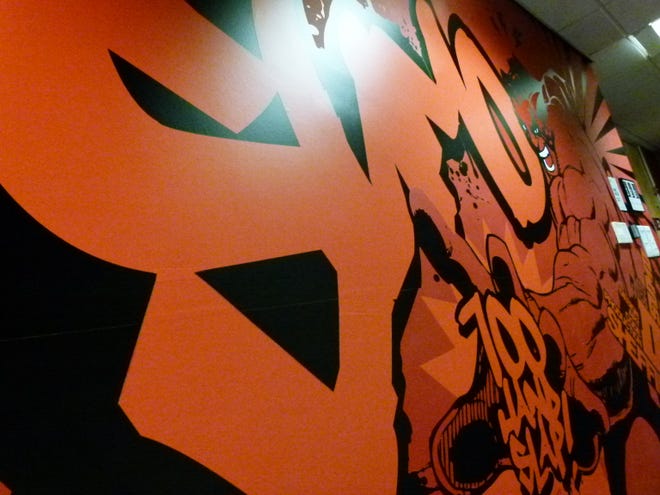
"We were handicapped by a couple of things," adds Carl Cavers, Sumo Digital CEO. "One was how it works, and the other was that we were owned by Foundation 9. We wouldn't be able to get support from them to do any self-publishing - they had a completely different strategy, which we weren't happy with. And secondly, even if we got an idea, we didn't want to create a load of value for Foundation 9!"
What the game jam can do, however, is create a fair bit of value for the eventual winner, with a deal in place that if a game goes on to be published - as Snake Pass was - the creator nets 10 per cent of all receipts, which isn't a bad motivator.
"It creates a huge buzz in the studio," says Cavers. "You see people sharing ideas who would have never thought about that process. It's a natural extension to how we used to form ideas 25 years ago - we used to sit together to talk about what the next game is going to be - but as you grow you can't do that, you lose that process subconsciously. You don't realise you've lost it until you try and work out what the next process is."
For a studio that's got its roots in the heady 8-bit days of Gremlin Interactive and that now oversees operations in Sheffield, Nottingham and Pune in India, it's helped it retain a little punchiness, as well as showcasing some of the considerable talent on its books. So, without further ado, let's take a little look at a handful of this year's contestants, shall we?
Legatus
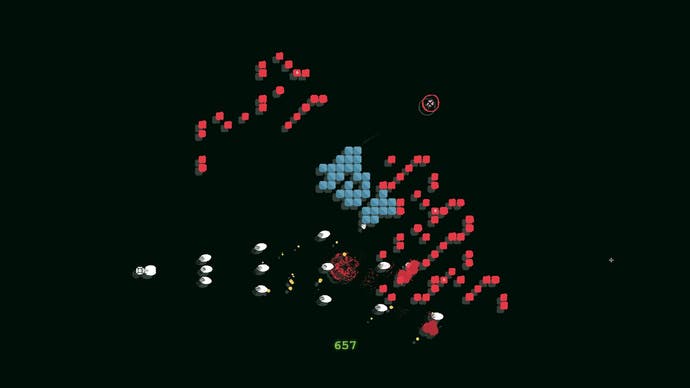
Imagine if Platinum Games made a 2D shooter. Now, imagine they made it in a handful of days. Despite being rustled up in record time, Legatus feels like the finished article - there's some of that Vlambeer chunkiness in its ballistics, and a nice little hit pause thrown in for good measure too. A shame, then, that I was absolutely dreadful at it.
8-Legged Project
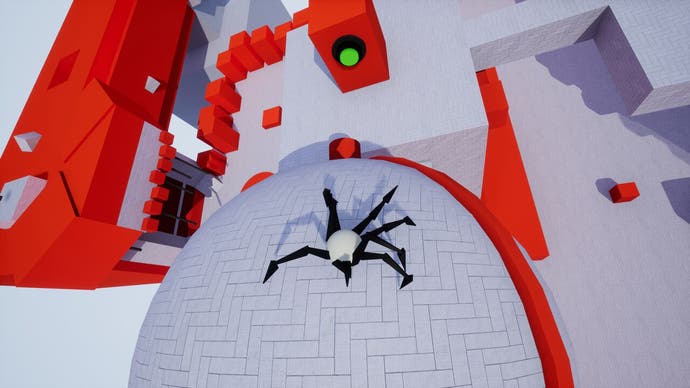
Continuing the zoological theme started by Snake Pass, this is a platformer viewed through the prism of another curious creature. This time it's a spider, which basically means any surface is fair game - and totally removes the concept of up and down. It's a bit Mario Galaxy-esque, and praise doesn't really come much higher than that.
Groovy

This really shouldn't work, but somehow - and quite brilliantly - it does. In Groovy, you simply have to trace a line through what looks like a psychedelic colon, following the curves with your thumbstick. And... That's it. So why did I spend more time on this than anything else at the game jam? Maybe because it's beautifully hypnotic, soothing and the kind of thing I want to play on my phone right now.
GameFlow
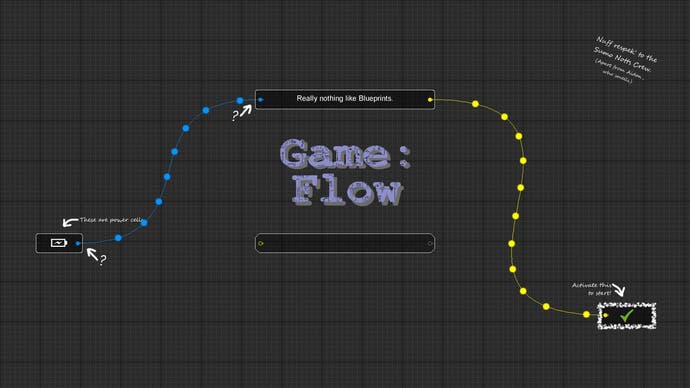
A brilliantly tactile game that's all about logic gates, and a mild meditation on game development tools themselves. In my short time with GameFlow it achieved what only the very best puzzle games do, folding in its mechanics until I was doing what would have seemed impossible just minutes before. This one seems fully formed, and I'm more than ready to play more.
Dawn of the Fireflies
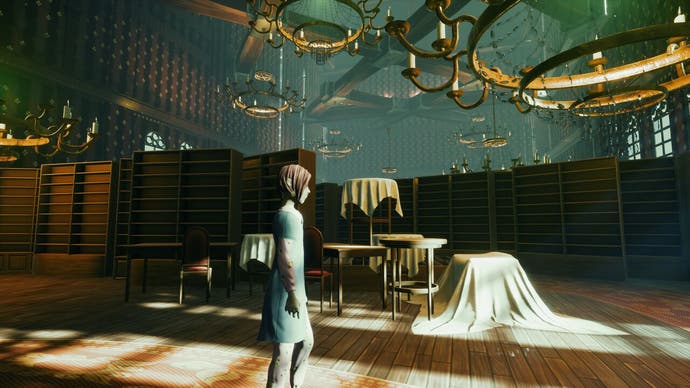
An incredibly ambitious, exceptionally gorgeous game that's perhaps trying to do a bit too much, especially given the amount of time in which it was pulled together. Controlled using eye tracking, you're searching for light sources that keep your jar of fireflies alive as you explore an abandoned mansion. That's the idea, anyway - the build presented was so difficult it was tough to get past the first corridor. A shame - I'd love to see the idea given a bit more time so it can properly shine.
This sounds trite, I know, but it's almost a shame there could only be one winner - and a part of me hopes that some of these other ideas live on and get to be fulfilled in other ways. But, alas, there could only be one, and 8-Legged Wonder was given the prize. It's certainly got potential to be something special, and to be expanded upon for a fuller experience - as with Snake Pass before it. Will it get that far? It's too early to say right now, but I wouldn't be surprised to see this tarted up and fleshed out on a download store near you in the not too distant future.
Just as I wouldn't be surprised to see more Sumo Digital games of a similar nature making their way out to the wild - a prospect I'd very much welcome. Is that the plan for the future of the business? "We've not set out to be a publisher at all," says Cavers. "Our core business is our core business, and that is working with the partners that we work on. There's no way we'll ever be able to afford to do those projects ourselves, and they're the projects we want to work on. Those big triple-A games. But working on self-published projects, it allows us to explore a different avenue of the business."
"By creating a back catalogue of IP, it's like a shop window," says Porter. "It's a showcase of the creativity we can provide so we can be known as Sumo Digital, not just as someone who works on other people's IP."
I hope there is more, just because I'm always happy to play a Sumo Digital game - over its 14 years in business, I've come to see the name as an assurance of some kind of quality. "People say we've got a Sumo brand," Cavers tells me. "But you know what? I still don't recognise it! All we've done is try to do the right thing for the past 14 years. It's not something we've ever consciously tried to do! All we've said is, whatever you do, you're only as good as the last thing you deliver. So everything has to be good." Having spent an afternoon with some of Sumo Digital's sketches, it seems that philosophy extends to the stuff you might not get to play.

